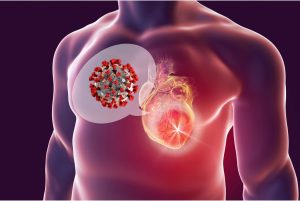Why People with Heart Conditions Face Higher COVID-19 Risks
Since the onset of the COVID-19 pandemic, medical experts have warned that individuals with pre-existing heart conditions are among those most vulnerable to severe illness. This includes people with cardiovascular disease, heart valve disease, congestive heart failure, and high blood pressure (hypertension).
In addition to other high-risk factors such as advanced age, obesity, and diabetes, cardiac conditions can compromise the immune system and heighten vulnerability to complications from COVID-19.
According to Dr. Roberto Scaffidi, a Cardiologist at Bayhealth, “Cardiac patients seem to be more susceptible to COVID-19 infection and experience more severe symptoms.” He also notes that the coronavirus can have both direct and indirect effects on the heart.

How COVID-19 Affects the Cardiovascular System
COVID-19 is primarily a respiratory virus, but its impact extends far beyond the lungs. The virus can directly or indirectly cause significant cardiovascular complications, especially in individuals with pre-existing heart issues.
Direct Effects of COVID-19 on the Heart:
-
Myocarditis: Inflammation of the heart muscle, which can weaken the heart’s ability to pump.
-
Arrhythmias: Irregular heart rhythms triggered by infection or inflammation.
Indirect Effects Include:
-
Increased blood clot risk: COVID-19 heightens the body’s tendency to form clots, which can block coronary arteries and cause heart attacks.
-
Plaque rupture: Inflammation caused by infection can destabilize plaque in the arteries, leading to rupture and cardiac events.
-
Secondary heart injury: Low oxygen levels, systemic shock, and low blood pressure due to severe COVID-19 symptoms can stress the heart and cause injury.
Why COVID-19 Is More Dangerous for Cardiac Patients
Heart disease already places strain on the body. When layered with a COVID-19 infection, the combined stress can overwhelm the cardiovascular system. Inflammation and oxygen deprivation put further pressure on an already compromised heart.
This is why those with heart-related conditions must take COVID-19 precautions seriously, often even more than the general population.
Essential Safety Precautions for Heart Patients During COVID-19
1. Strictly Follow Preventive Measures
Cardiac patients must go beyond the basic public health guidance. Dr. Scaffidi stresses the importance of:
-
Wearing a mask or face covering in public spaces
-
Washing hands thoroughly and regularly
-
Avoiding touching the face
-
Practicing physical distancing (6 feet apart)
-
Coughing or sneezing into the elbow, not hands
2. Limit Outside Exposure
Minimize outings by:
-
Using contactless delivery for groceries and food
-
Shopping during off-peak hours
-
Keeping in-person doctor visits to a minimum or switching to telehealth where possible
3. Continue Managing Your Heart Health
Despite the pandemic, neglecting heart care is not an option. Here are a few strategies:
-
Maintain a heart-healthy diet rich in fruits, vegetables, lean protein, and whole grains
-
Stay active with light at-home exercises like walking, yoga, or resistance bands
-
Monitor blood pressure and symptoms regularly
-
Take medications as prescribed, and keep in contact with your cardiologist
Tips for Emotional Well-being and Isolation
Many heart patients are older adults or individuals who may live alone. Isolation, while important, can lead to anxiety, depression, or worsening health habits.
Coping Strategies:
-
Stay socially connected via video calls or phone check-ins
-
Maintain a daily routine that includes meal planning, light exercise, and hobbies
-
Engage in stress-reducing activities like meditation, breathing exercises, or reading
-
Don’t hesitate to seek help—many mental health services are now available online
When to Seek Medical Attention
Avoid delaying care out of fear. If you experience any of the following, seek emergency care immediately:
-
Chest pain or discomfort
-
Sudden shortness of breath
-
Unexplained fatigue or dizziness
-
Symptoms of stroke (slurred speech, facial drooping, arm weakness)
Hospitals have implemented strict COVID-19 safety protocols to protect all patients—delaying treatment for a cardiac emergency can be far more dangerous than the virus itself.
Frequently Asked Questions:
Why are heart patients at higher risk for COVID-19 complications?
Heart conditions weaken the body’s ability to handle additional stress from infections like COVID-19, making complications more likely and more severe.
Can COVID-19 cause a heart attack?
Yes. COVID-19 can lead to systemic inflammation and blood clots, which may trigger plaque rupture or blockages in arteries, resulting in heart attacks.
Should cardiac patients avoid going to the hospital during the pandemic?
No. If you’re experiencing a cardiac emergency, go to the ER immediately. Hospitals follow strict protocols to reduce COVID-19 exposure risks.
Is it safe to exercise with heart disease during the pandemic?
Yes, staying active is important. Choose low-impact, indoor exercises and consult your doctor before beginning any new fitness routine.
Are telehealth visits effective for heart care?
Absolutely. Many cardiologists now offer virtual appointments to monitor symptoms, adjust medications, and provide care safely at home.




